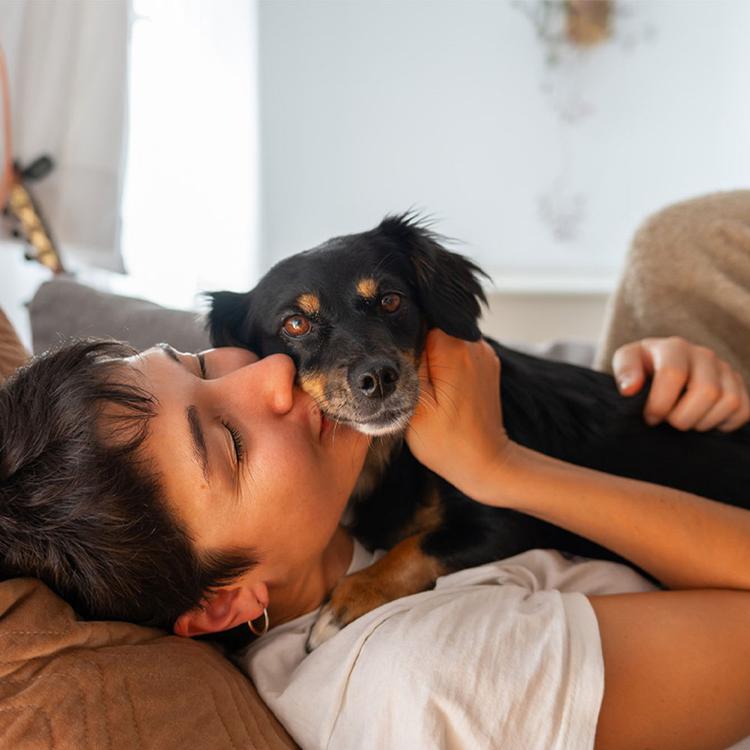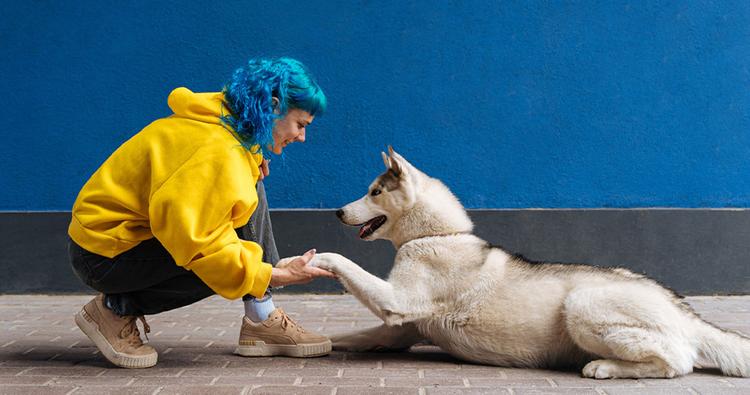15 Husky Mixes That’ll Woo Your Heart
Plus, five things to know before adding one of these mixed-breed dogs to your family.
Plus, five things to know before adding one of these mixed-breed dogs to your family.
by Alicia Kort, | November 8, 2023

Olga Murzaeva / Stocksy
It’s not surprising to see Husky mixed breeds cropping up on the streets and social media. With their stunning light-blue eyes, beautiful fluffy coats, and wolf-like appearance, no one can deny that the Husky is a handsome breed. Huskies have become exceedingly popular, so it’s only natural for people to start daydreaming about all the cuteness that could come from mixing them with another breed. And you don’t need to go to a breeder to get one of these designer dogs — you can find Husky mixes in rescues and shelters all over the country.
Like any mixed breed, their genes can manifest in all sorts of ways. The height, weight, coloring, and coat length of these Husky mixed breeds vary wildly, depending on which parent the pup takes after. It’s all genetics, so just because you see a Golden Retriever and Husky hybrid with blue eyes and golden fur doesn’t mean that’s exactly what you’re going to get.
Some of these mixes might have short, low-shedding fur, while others are small enough to stick in your bag and tote around town. But most of these dogs are most likely going to be highly active, pretty stubborn, and require a lot of grooming — so they aren’t for everyone. Below, all the Husky mixes you may encounter.

Jonathan Byrne / Shutterstock
The Pomsky is a fluffy, double-coated, affectionate pup. They fall somewhere between small and medium in scale, depending on how large their parents were. These pups may inherit a high-prey drive from their Husky parent and a protective tendency from the Pomeranian parent, which means they aren’t best-suited for families with small children and other pets. It’s important to train them when they’re still puppies, because they can be willful and stubborn. But that’s not to say that they’re not huge snugglers.
Estimated size: 7 to 38 pounds
Search for adoptable Pomskies on Adopt a Pet

Mike / AdobeStock
The Horgi are a popular mix between Corgis and Huskies. This breed of pup will likely inherit the Corgi’s herding instinct and the Husky’s prey drive. Unless you want to be herded around your kitchen, they will need to be trained out of that behavior. But because both breeds are considered working dogs, your Horgi will be eager to learn. This type of pup will have plenty of energy, so they’re a better pet for active pet parents who enjoy long walks, hikes, and plenty of playtime.
Estimated size: 20 to 50 pounds
Search for adoptable Horgis on Adopt a Pet

ROMA VISION / Shutterstock
The Goberian is a medium-to-large mix of the Golden Retriever and Husky. High-energy, playful, and loving, the Goberian can be a great pet for families with yards. This pup does love to be around their pet parents, so they can be prone to destructive separation anxiety if left alone for too long. They’re highly intelligent, sometimes mischievous (especially if their personality is more like a Husky than a Retriever), so mentally stimulating dog toys are a necessity to keep them calm and happy. This mixed breed also is prone to perpetual shedding, and pet parents should be prepared to commit to a lot of grooming and vacuuming.
Estimated size: 50 to 90 pounds
Search for adoptable Goberians on Adopt a Pet

BarTa / AdobeStock
The Shepsky, a mix between a German Shepherd and Husky, is the ultimate work dog. Combining these two high-energy, devoted, and intelligent breeds has resulted in a mix that needs lots of mentally stimulating activity (or a job) instigated by a confident, experienced pet parent. Both breeds are pack animals, so they look to a leader to be told how to behave (although they will sometimes challenge that leadership). They can act out and become destructive if they’re left alone too long. These pups are best for active pet parents. This crossbreed can live with other pets and older children, but needs to be socialized early in order to keep the overprotective behavior at bay. The Shepsky does vary in eye color and fur color, but one thing is for sure — these cold-weather pups will shed continuously, in addition to going through a few, big shedding seasons.
Estimated size: 45 to 88 pounds
Search for adoptable Shepskies on Adopt a Pet

AllisonJ7 / Shutterstock
The Pitsky, a combination of a Husky and a Pit Bull, is the first short-haired Husky mix on this list (though they can sometimes have longer hair). This pup is a better choice for those who don’t want to spend a lot of time and effort when it comes to grooming. That said, the Pitsky is an affectionate family dog with boundless energy. They require at least two hours of exercise, so they’re a better fit for an active pet parent with whom they can go on adventures. If socialized early, they can be good, loyal, and snuggly additions to families. It is recommended that they remain supervised around other household pets, because they have a high prey drive and a tendency to challenge other animals for the role of pack leader.
Estimated size: 30 to 80 pounds
Search for adoptable Pitskies on Adopt a Pet

MovieAboutYou / Shutterstock
The Chisky is a Chihuahua and Husky mix. This is a very rare breed of pup for reasons that don’t seem surprising, and like the Pomsky, usually requires the female dog to be artificially inseminated. Compared to many pups on this list, this breed is on the smaller side and can be either a small- or medium-size dog. The Chisky can inherit the Husky’s signature blue eyes, though the fur length will be determined by the Chihuahua you’re mixing the Husky with and whose features are more dominant — so you can end up with either a short- or long-haired pup. This breed can thrive in small spaces if they get enough exercise, though they do have a tendency to bark. This pup might be better in a kid-free home as a single pet, because they are more likely to get injured if mishandled due to their size, and can become defensive and protective.
Estimated size: 8 to 20 pounds
Search for adoptable Chihuahua mixes on Adopt a Pet

Felicia Lee / iStock
The Huskydoodle, a mix between a Husky and a Poodle, is usually bred for shedding and allergy reasons, though it’s not guaranteed that pet parents will get a Huskydoodle with a low-shed coat. These mixed pups can vary widely in appearance, depending on which parent has the more dominant traits. High-energy and intelligent, the Huskydoodle requires a lot of exercise and mental stimulation, or they can grow anxious. The Huskydoodle typically loves to cuddle and is generally good around children and other dogs, though they can become stubborn and challenge pack leadership.
Estimated size: 40 to 60 pounds
Search for adoptable Poodle mixes on Adopt a Pet

pampamkyr / Shutterstock
The Labsky, which is a mix between a Labrador and a Husky, is known as a fun-loving pal who needs plenty of playtime. Their ideal home is a house with a big backyard to run around in (or parks nearby), because both parent breeds are very active working dogs. This pup might even take after the Lab and enjoy swimming. The Husky can be independent and stubborn, but usually the Lab’s mellow nature does balance out this pup, making them good for families with kids. The Labsky may have a high prey drive, though, so they should only be paired with pets who are about the same size.
Estimated size: 40 to 60 pounds
Search for adoptable Labrador mixes on Adopt a Pet

Sean-ONeill / Shutterstock
The Ausky, which is an Australian Shepherd and Husky mix, is most likely going to have those coveted bright-blue eyes. This dog is typically medium-size, and thanks to their working parents (sled dogs and cattle dogs), they are going to need about two hours of exercise per day. They’d be happiest with a family of hikers, because they want to spend a lot of time with loved ones while being active. These pups can become destructive if left alone too long or if they’re under-exercised. Both parents also boast quite the heavy, blowing double-coat. So potential pet parents should know that this breed will go through several shedding seasons and require consistent grooming.
Estimated size: 40 to 65 pounds
Search for adoptable Aussie mixes on Adopt a Pet

Majonit / Shutterstock
The Border Husky is a hybrid mix of the Border Collie and Husky. This pretty, medium-size pup is a combination of two of the smartest dog breeds out there, so any pet parent should be prepared to have some spirited arguments with their pet and come up with ideas on how to keep them mentally stimulated. They require at least 90 minutes of exercise a day and should have plenty of space to run around in — they aren’t suited to small-space living. Although they are very affectionate with their family, they can be standoffish to strangers. With their high prey drive and herding tendencies, they might be better living with a family with no other pets or kids.
Estimated size: 30 to 45 pounds
Search for adoptable Border Collie mixes on Adopt a Pet

Andrej Antic / Shutterstock
The Boxsky is a mix of a Boxer and a Husky. This medium- or large-size pup might get the Husky’s blue eyes and a slightly shorter coat, which still requires some grooming but not as much as the Husky’s blowing coat. Expect this tall pup to be willful, goofy, affectionate, and protective. The Boxsky requires at least 90 minutes of exercise per day and is happier in homes that have yards.
Estimated size: 30 to 80 pounds
Search for adoptable Boxer mixes on Adopt a Pet

Georges Hanna / Shuttersock
The Dobsky is a hybrid of the Husky and the Doberman Pinscher. Usually a medium to large dog with a shorter coat, the Dobsky is a loving, loyal, energetic dog that requires plenty of exercise. The Dobsky can become overprotective of their family, so they will require training and socializing at a young age to help combat overreactions to strangers (both human and animal).
Estimated size: 40 to 90 pounds
Search for adoptable Doberman mixes on Adopt a Pet

Maxime Gruss / Shutterstock
The Akita-Husky mix is a very fluffy Husky hybrid that is a medium- to large-size pup. This breed is high-energy and would benefit from a job — as Huskies used to pull sleds, and Akita used to guard Japanese Royalty. Due to the latter’s history, the Akita Husky mix can grow over-protective of their families. Akitas are known for being better off as the only pet, whereas Huskies grow up in packs. So it’s a toss-up on how these pups will behave toward strangers. There is one thing that’s for sure: They do shed.
Estimated size: 50 to 75 pounds
Search for adoptable Akita mixes on Adopt a Pet

Bull City Dogs / Animal Protection Society of Durham / Flickr
The Beagle-Husky mix is a medium-size combination of two working dogs. While the Husky was pulling sleds across the tundra, the Beagle was using their famous nose to sniff out prey and point hunters in the right direction. This highly intelligent hybrid will need a lot of mental stimulation, like nose work and games in order to keep them from becoming destructive. They need plenty of room to run around as well as plenty of training. They can be both stubborn and sensitive, so need to be trained thoughtfully — firmly but without being too harsh. This pup generally gets along with other dogs, as both breeds are pack animals. Their hair length and shedding can vary widely, depending on which parent they take after.
Estimated size: 35 to 50 pounds
Search for adoptable Beagle mixes on Adopt a Pet

Rebecca Wilke / Shutterstock
The Husky Rottweiler mix is a rare Husky hybrid. These pups are athletic, have high exercise requirements, and come with working-dog backgrounds. The Rottweiler was bred to pull carts and herd livestock, so with that in mind, it’s important to keep this hybrid mentally stimulated. They are not recommended for inexperienced pet parents, because both breeds have stubborn streaks. This breed can be good for families, but their overprotectiveness will need to be curbed during training sessions. It’s also important for this pup to have plenty of space inside and outside the house, so they can expend their energy. The Rottsky will have a double coat, though the length will depend on the individual dog. Regardless, they do shed and will require weekly brushing.
Estimated size: 40 to 110 pounds
Search for adoptable Rottweiler mixes on Adopt a Pet
Husky and Malamute mix
Great Pyrenees and Husky mix
Husky and Pug mix
Samoyed and Husky mix
Cane Corso and Husky mix
Shiba Inu and Husky mix
Blue Heeler and Husky mix
Chow Chow and Husky mix
Dalmatian and Husky mix
Husky and Great Dane mix
Belgian Malinois and Husky mix
Before committing to a Husky mix, here are a few things that you should keep in mind:
When we say high energy, we mean it. These dogs require at least an hour of exercise per day, but some of these mixed breeds need as many as two hours. If you are not an active person or don’t see yourself having time to throw a ball around to your pup for an hour a day (plus walks), a Husky mix isn’t the right dog for you.
While most Husky mixes are medium-size, some may be smaller or larger, due to genetics. It all depends on which breed the Husky is mixed with, and whose genes are more dominant. For example, a Husky and Doberman mix is going to look very different from a Husky and Corgi mix.
Husky mixes could have the blue eyes that you’ve been hoping your pet will have, but it’s not a guarantee. Husky mixes could have one blue eye and one brown eye, or both brown eyes. It all depends on the genetics of their parents.
Huskies are typically a black-and-white or brown-and-white mix. But with other dogs, like Labs and German Shepherds thrown into the mix, we really can’t be sure what colors your dog’s fur will be. It’s best not to have expectations going in.
Husky mixes will likely have a strong urge to go after animals that they would consider prey or are smaller than themselves. This means that Husky mixes might not be suited to homes that have cats or small dogs. They can be trained out of this behavior, if socialized with these pets when they’re puppies. But this natural instinct can be hard to get a handle on for pet parents who don’t have professional assistance.
Absolutely! Husky mixes are wonderful pets. Huskies are pack animals, so they love to spend time with their families and are very loyal. Husky mixes, like other dog breeds, need plenty of physical and mental exercise in order to keep calm and happy. If their needs aren’t being met, they can become destructive and start acting out.
Yes, Husky mixes are generally considered healthy dogs, especially because they don’t come with a host of health issues that purebred pets can face. That being said, Huskies are predisposed to cataracts and other eye issues such as progressive retinal atrophy and corneal dystrophy — due to those beautiful blue eyes of theirs. They should have their eyes checked yearly to catch any potential issues quickly. Huskies can also be prone to hip dysplasia and hypothyroidism. Other issues might arise based on what the other breed has a predisposition towards.
Husky mixes can live anywhere from eight to 20 years, depending on the life expectancy of the breed that they’re mixed with. For example, a Husky Chihuahua will live longer than a Husky Boxer.
Although these Husky mixes are considered to be designer dogs, that doesn’t mean that you need to buy them from a breeder. There are plenty of Husky hybrids that are in shelters, unfortunately. Some pet parents who have adopted these high-energy breeds are not prepared to take care of them, so they languish in shelters, waiting for their perfect forever homes.
You can adopt a Husky mix from local shelters, local rescues, breed-specific rescues, and of course, Adopt a Pet. There is no shortage of places to find Husky breeds looking for a family.
Reference
Dog Health Issues: Do Mixed Breed Dogs Have an Advantage Over Purebred Dogs?
Study Reveals Genetic Diseases of Mixed-Breed, Purebred Dogs

Alicia Kort is a writer and editor living in Brooklyn. She’s currently the senior commerce editor at Apartment Therapy. She’s been published in StyleCaster, Electric Literature, Newsweek, Interview, Brooklyn magazine and more. In her free time, she runs, reads, and spends time with her dog-nieces, Maya and Lady, and her cat-niece, Pepper.

Breed Info

Adoption Advice

Breed Info


Breed Info
Looking for an MVP doggo with energy to burn? Head to your local rescue or shelter, and check out these breeds and mixes.
